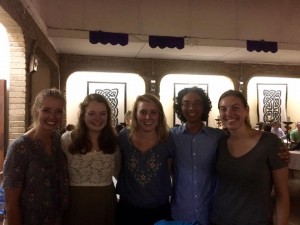“A different pace of life” it is common to talk about but is it good or bad? Perhaps neither, or, more accurately, both?
To raise money for the hospital, a team of people put on a Ceilidh with Scottish flags in the corner, an impressive number of kilts for any gathering in Malawi, bagpipes, and a live band accompanied by a caller instructing us on how to skip and twirl and swing around with the time of the music. It was fantastic, and the dancing had a similar feel to enthusiastic square dancing. (Picture below) But the story for this post, though seemingly insignificant in comparison to such an event, is representative of something I’ve been thinking a bit about.
In our attempt to buy tickets for the Ceilidh, Elizabeth and I were directed to an office at the hospital. Hesitantly we knocked and entered. The woman looked expectantly, and, as we started asking if we were in the right place and could buy tickets from her, she interrupted. “How are you?” she asked, in the same tone a parent uses when a child forgets to say “please.” After a quick backtrack we corrected our mistake and exchanged pleasantries before proceeding to buy our tickets.
It is easy to justify skipping the “Hi, how are you” as it is likely you will only ever receive the automatic response of “good” or “fine.” However, this week has been a lesson in both consciously conforming to another culture and also realizing the importance of how a conversation is started. We start by acknowledging the other human before acknowledging the task. Perhaps in this case a slower pace of life is less efficient, but is justified by its other merits.
